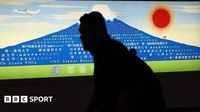In a highly anticipated summer tour first Test, Wales faced Japan at the Mikuni World Stadium in Kitakyushu on Saturday, July 5, 2025, with kick-off at 06:00 BST (14:00 local time). This match marked a crucial moment for Welsh rugby, as the team sought to end a staggering 17-match losing streak stretching back to October 2023. The game, broadcast live on BBC One Wales and BBC iPlayer, also featured radio coverage on BBC Radio Wales, BBC Radio Cymru, and BBC Sounds, with live text commentary available on the BBC Sport website and app.
Interim head coach Matt Sherratt, who took over from Warren Gatland during the Six Nations Championship earlier this year, led a revamped Welsh side. Sherratt’s squad featured 11 changes from the team that suffered a record 68-14 defeat to England in March, with only number eight Taulupe Faletau, prop Nicky Smith, centre Ben Thomas, and full-back Blair Murray retained. The Welsh team also welcomed back flankers Josh Macleod and Alex Mann, centre Johnny Williams, and a new half-back pairing of Kieran Hardy and Sam Costelow. Uncapped Cardiff captain Liam Belcher was named on the bench and could make his international debut.
Japan, coached by Eddie Jones in his second year of a second stint with the Brave Blossoms, named an inexperienced side with two uncapped players starting—wing Kippei Ishida, touted as a potential Japanese version of South Africa’s Cheslin Kolbe, and prop Yota Kamimori—and six uncapped players on the bench. Veteran flanker Michael Leitch captained Japan in his 88th cap, supported by regulars Warner Dearns, Dylan Riley, and Seungsin Lee.
The venue, Mikuni World Stadium, opened in 2017 and holds 15,300 spectators. It was the setting of Wales’ 2019 World Cup training base in Kitakyushu, a city that embraced the Welsh team with enthusiasm. Over 15,000 locals gathered to watch Wales train back then, even singing the Welsh national anthem with passion. This match was only the stadium’s second international after Japan hosted Uruguay in 2022.
The game began under sweltering conditions, with temperatures expected to reach 33°C and high humidity. World Rugby’s updated heat and air quality guidelines mandated three-minute water breaks midway through each half and an extended 20-minute half-time, instead of the usual 15 minutes, to help players cope with the oppressive heat.
However, the match was dramatically halted just 27 seconds in after Wales lock Ben Carter suffered a heavy blow to the head in contact. Referee Damian Schneider immediately stopped play, with medical teams rushing onto the pitch. The stadium fell silent as Carter was attended to for around four to five minutes before being stretchered off to applause. James Ratti replaced him in the second row. BBC commentator Gareth Rees-Owen confirmed Carter would not return to the field, while co-commentator Richie Rees highlighted the challenge of managing energy levels in the heat after such an early stoppage. Former Wales fly-half Rhys Patchell suggested the pause might have taken the wind out of Japan’s sails, known for their fast starts.
Despite the early scare, Wales took an early lead through centre Ben Thomas, who showed composure to get the scoreboard moving. Johnny Williams, returning to Test rugby after nearly two years, started at inside centre (jersey 13) and gradually found his rhythm, delivering some neat handling and a quick offload to Tom Rogers for a notable moment. Williams, however, was caught narrow defensively on occasion, including during both Japan tries, as noted in a post-match assessment by Wales Online.
Flanker Alex Mann, who had battled back from a back injury sustained earlier in the season, was praised for his tireless work rate around the park, contributing in both attack and defense throughout the match. Mann's efforts, alongside those of other forwards like Taulupe Faletau and Josh Macleod, underlined Wales' determination to fight back despite the mounting pressure.
Wales captain Dewi Lake, who has led the side in six of the 17 consecutive defeats, spoke openly about the significance of the match. “We understand the importance of a win,” Lake said. “It's a huge game for us, to hopefully not only kickstart our Japan tour, but also the new season. We've had that monkey on our back for a long time, trying to get that win. All the boys here are going to try do it for each other and our families back home who support us through everything. So it'd be massive to get that elusive win.”
Sherratt echoed the sentiment, emphasizing the players’ motivation. “I spoke to the players before we came away, I wondered what their motivation was and why they were coming here. The short answer was they want to win for Wales,” he said. The interim coach also acknowledged the challenge posed by the conditions and the quality of the opposition but remained focused on the task at hand. “It's part of the challenge of coming to a different country. They’re not going to change the conditions and part of coming here is accepting them. They’re the same for both teams, so I’m not hugely worried about it.”
Japan, meanwhile, had endured a tough run themselves under Eddie Jones, with four wins and eight losses since his return, including heavy defeats by New Zealand, France, and England in 2024. Nonetheless, Jones remains the only coach to have led Japan to a victory over Wales, a 23-8 win in 2013. His squad, though young and inexperienced, was expected to leverage home advantage and the heat to try to unsettle the visitors.
As the match progressed, the Welsh side showed signs of resilience but also faced the challenges of a slippery ball due to the humid conditions, which Sherratt had prepared for by training with soapy water-doused rugby balls. The game tested both teams’ skill and endurance, with the heat acting as a great leveller.
At half-time, Wales hooker Elliot Dee provided a reassuring update on Ben Carter’s condition, stating that Carter was “up and around” and “all good,” easing concerns after the early injury scare. The match remained tightly contested, with both sides eager to make a statement.
Wales’ world ranking currently sits at an all-time low of 12th, just one spot above Japan. A loss in Kitakyushu would see them drop to 14th, below Japan and Samoa, potentially impacting seedings for the 2027 Rugby World Cup draw later this year. This added a layer of urgency to Wales’ campaign, as they prepare for challenging fixtures ahead, including matches against Argentina, New Zealand, South Africa, and the Six Nations.
The Test match was officiated by referee Damian Schneider from Argentina, with England’s Karl Dickson and Luke Pearce as assistant referees, and Ian Tempest serving as the television match official (TMO).
For fans unable to attend, the match was available for free live streaming in the UK via BBC iPlayer and on BBC One Wales, with commentary by Gareth Rhys Owen and Richie Rhys, punditry from Alun Wyn Jones and Rhys Patchell, and hosting by Sarra Elgan. International viewers could access the game through platforms such as Sky Sport NZ or via VPN services like NordVPN to bypass geo-restrictions.
As the first Test concluded, the rugby world watched closely to see if Wales could finally halt their historic losing streak and begin a new chapter in their rugby journey. The second Test, scheduled for July 12 in Kobe, promises to be another intense encounter as both teams vie for supremacy in this developing rivalry.





